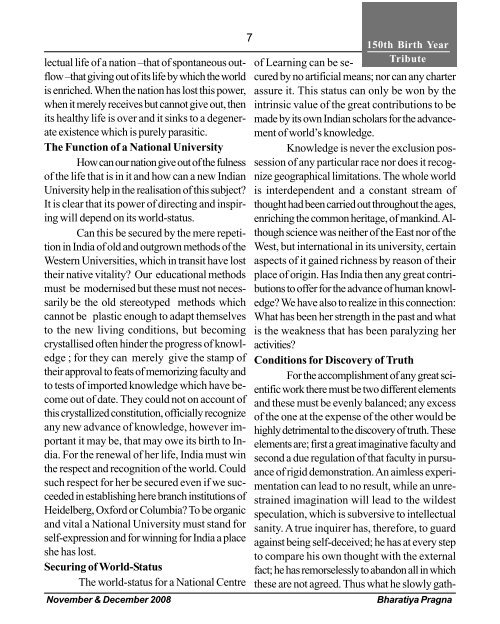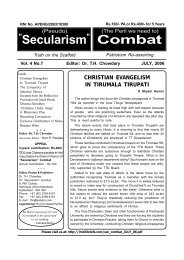Bharatiya Pragna - Dr. Th Chowdary
Bharatiya Pragna - Dr. Th Chowdary
Bharatiya Pragna - Dr. Th Chowdary
You also want an ePaper? Increase the reach of your titles
YUMPU automatically turns print PDFs into web optimized ePapers that Google loves.
lectual life of a nation –that of spontaneous outflow<br />
–that giving out of its life by which the world<br />
is enriched. When the nation has lost this power,<br />
when it merely receives but cannot give out, then<br />
its healthy life is over and it sinks to a degenerate<br />
existence which is purely parasitic.<br />
<strong>Th</strong>e Function of a National University<br />
How can our nation give out of the fulness<br />
of the life that is in it and how can a new Indian<br />
University help in the realisation of this subject?<br />
It is clear that its power of directing and inspiring<br />
will depend on its world-status.<br />
Can this be secured by the mere repetition<br />
in India of old and outgrown methods of the<br />
Western Universities, which in transit have lost<br />
their native vitality? Our educational methods<br />
must be modernised but these must not necessarily<br />
be the old stereotyped methods which<br />
cannot be plastic enough to adapt themselves<br />
to the new living conditions, but becoming<br />
crystallised often hinder the progress of knowledge<br />
; for they can merely give the stamp of<br />
their approval to feats of memorizing faculty and<br />
to tests of imported knowledge which have become<br />
out of date. <strong>Th</strong>ey could not on account of<br />
this crystallized constitution, officially recognize<br />
any new advance of knowledge, however important<br />
it may be, that may owe its birth to India.<br />
For the renewal of her life, India must win<br />
the respect and recognition of the world. Could<br />
such respect for her be secured even if we succeeded<br />
in establishing here branch institutions of<br />
Heidelberg, Oxford or Columbia? To be organic<br />
and vital a National University must stand for<br />
self-expression and for winning for India a place<br />
she has lost.<br />
Securing of World-Status<br />
<strong>Th</strong>e world-status for a National Centre<br />
7<br />
150th Birth Year<br />
of Learning can be se- Tribute<br />
cured by no artificial means; nor can any charter<br />
assure it. <strong>Th</strong>is status can only be won by the<br />
intrinsic value of the great contributions to be<br />
made by its own Indian scholars for the advancement<br />
of world’s knowledge.<br />
Knowledge is never the exclusion possession<br />
of any particular race nor does it recognize<br />
geographical limitations. <strong>Th</strong>e whole world<br />
is interdependent and a constant stream of<br />
thought had been carried out throughout the ages,<br />
enriching the common heritage, of mankind. Although<br />
science was neither of the East nor of the<br />
West, but international in its university, certain<br />
aspects of it gained richness by reason of their<br />
place of origin. Has India then any great contributions<br />
to offer for the advance of human knowledge?<br />
We have also to realize in this connection:<br />
What has been her strength in the past and what<br />
is the weakness that has been paralyzing her<br />
activities?<br />
Conditions for Discovery of Truth<br />
For the accomplishment of any great scientific<br />
work there must be two different elements<br />
and these must be evenly balanced; any excess<br />
of the one at the expense of the other would be<br />
highly detrimental to the discovery of truth. <strong>Th</strong>ese<br />
elements are; first a great imaginative faculty and<br />
second a due regulation of that faculty in pursuance<br />
of rigid demonstration. An aimless experimentation<br />
can lead to no result, while an unrestrained<br />
imagination will lead to the wildest<br />
speculation, which is subversive to intellectual<br />
sanity. A true inquirer has, therefore, to guard<br />
against being self-deceived; he has at every step<br />
to compare his own thought with the external<br />
fact; he has remorselessly to abandon all in which<br />
these are not agreed. <strong>Th</strong>us what he slowly gath-<br />
November & December 2008 <strong>Bharatiya</strong> <strong>Pragna</strong>



